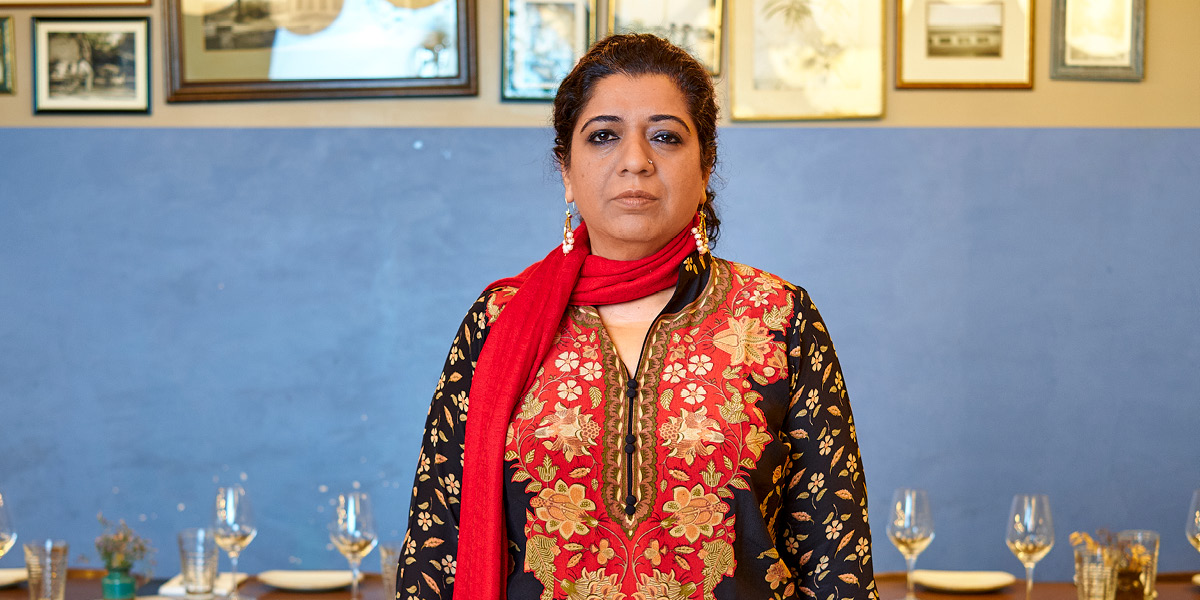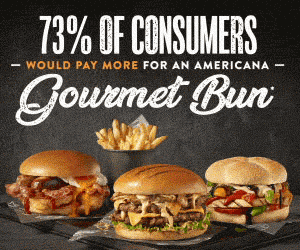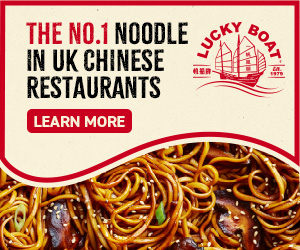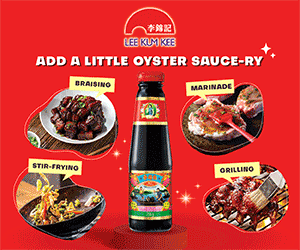Interview: Asma Khan, Darjeeling Express

"If a door doesn't open to you, bring down the entire building"
Before lockdown 2.0 in England, Rosanna Spence discovered why Asma Khan believes restaurants should be ranked based on their humanity, not their Michelin stars, and how she's planning to train a new fleet of female leaders.
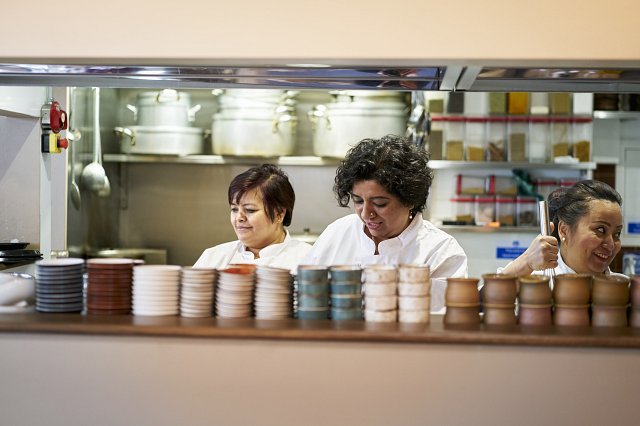 Asma Khan has been proudly leading her all-female brigade at Darjeeling Express in Kingly Court, Soho, since 2017. From her infamous and intimate supper club beginnings, she now looks every part the leader – and a successful one at that. Khan was the only chef named in Vogue’s Top 25 Women Shaping 2020, has appeared on the Netflix series Chef’s Table and featured as an exemplary female London chef alongside the likes of Clare Smyth and Monica Galetti in the Evening Standard’s International Women’s Day showcase. But in fact, Khan sees herself operating as one unit with her kitchen peers at Darjeeling Express.
Asma Khan has been proudly leading her all-female brigade at Darjeeling Express in Kingly Court, Soho, since 2017. From her infamous and intimate supper club beginnings, she now looks every part the leader – and a successful one at that. Khan was the only chef named in Vogue’s Top 25 Women Shaping 2020, has appeared on the Netflix series Chef’s Table and featured as an exemplary female London chef alongside the likes of Clare Smyth and Monica Galetti in the Evening Standard’s International Women’s Day showcase. But in fact, Khan sees herself operating as one unit with her kitchen peers at Darjeeling Express.
“We don’t have hierarchy in the kitchen here,” she explains. “Everybody is on the same level and paid the same rate. I work in the kitchen and I’m on the same rate as the porter who washes the pots. That is a great leveller, because we don’t have labels that we put on people – we don’t have titles, this is not the army.
“I don’t see success in personal terms, I see a community of women succeeding. That’s what drives me and that is where my passion is. I want to see women lift each other up. I stand on the shoulders of my whole female kitchen team. They are my strength. They can see me through all the ups and downs of life, they are there like a rock on which I stand.”
Women account for just 17% of chef positions in the UK, despite the number of females entering the sector generally growing before the pandemic hit. But Khan’s determination is not to just see more women in professional kitchens, she wants to help them collectively rise through the restaurant industry as compassionate leaders and is creating a space in her new site where this idea can bloom.
Earlier this year it was announced that her team would up sticks from its original Kingly Court unit to move to a flagship site at Covent Garden’s prestigious Floral Court, and now includes a deli, which has been busy during lockdown. Due to open mid-November, it will now welcome guests through the doors depending on London’s Covid-19 tier status.
“I was excited about getting a space as big as the restaurant I have, because at night in the deli I want to set up a mentoring school for women – not to teach them how to cook or how to be front-of-house, I want to teach them how to lead,” Asma says. “In my lifetime I want to see a generation of women leading in hospitality, because we need women to be at the table, being decision makers and recruiting. I want to create that change and I realised you can’t do it from the bottom up, so now I want to see it from the top down.
“I think women bring such strength of character and interpersonal skills. We are compassionate people – these are the things hospitality needs right now. We have all been through a testing time. This is not the time to close shop, exploit your workers, send them home if they’re late, cut their wages or make them work on zero-hour contracts.”
Flying the flagship
Khan’s new Covent Garden site (a former Carluccio’s) did not fall into her lap. She had set her sights on a larger premises last year, but felt that landlords were disinterested because she didn’t come with the ‘vital attachment’ she calls ‘a man in a suit with money’. Multiple conversations littered with empty promises left her confused.
“It was quite a shock because I had paid my taxes, I had the business plan and I had figures showing very successful trading,” she adds, “so it was perhaps prejudice, bias or it could have been just possibly that there was absolutely no property available – which does seem unlikely.
“It is important others who read this realise that if that was happening to me, they need to claim their space too. This can happen to everybody who’s not part of the elite networking group, and if you’re seen as an outsider you lose out. But you do not need to force yourself to network on those terms.”
By the time Covid-19 had taken hold of the UK on a national level, Khan was adamant that she needed to move to a larger unit where her staff and customers would benefit from the increased space.
“I’m very lucky I’m building a restaurant in a pandemic,” she says – adding that she was able to secure the new location thanks to someone representing the Covent Garden landlord who showed ‘great imagination and courage’ by offering her the flagship site. “Inside, we have lots of social distancing between tables, avoiding congestion and taking into consideration how people walk around. We’re taking all these precautions and are designing everything based on safety.”
Khan doubts that she would have been offered such a prominent flagship site had it not been for Covid-19 – but as the virus ‘gives’ with one hand, it takes away with the other. She sadly lost multiple members of her own family to the pandemic, and most of her kitchen team have families in India, where lockdown has been particularly devastating.
“My new site is the kind of place that you may have seen me as a customer in, but not as someone who actually runs the restaurant,” she adds, proclaiming that she remains an optimist. “I’m excited, not for myself so much, but I’m excited that other people will see me there and then be brave. What holds us back are our own insecurities, our own fears that we don’t belong. We belong everywhere – if a door doesn’t open to you, bring down the entire building. Walk into spaces and occupy them; it is our right to be where we want to be, not where society thinks we should be.”
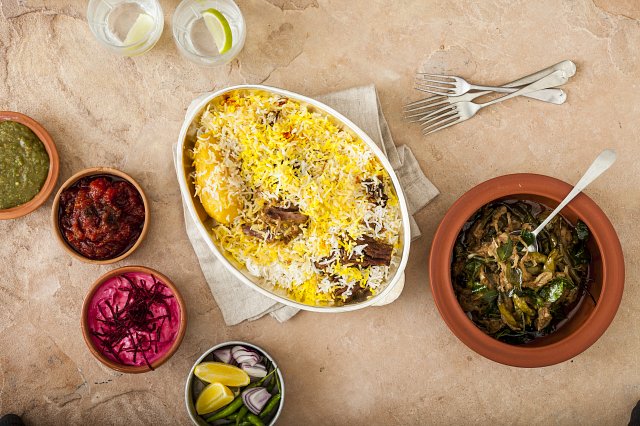 The a-gender
The a-gender
With the entire industry entering some form of survival mode this year in response to the pandemic, is Khan worried this risks a sense of regression, in terms of diversity policy and personal support in restaurants, as other operational factors take priority?
“It’s interesting because I have met and spoken to lots of women who were made redundant [due to coronavirus],” she notes. “It was always the women who had children – because everybody was concerned about schools having to close. Women have disproportionately paid the price during this re-adjustment. Again this is about self-selection, where invariably in these places a decision maker was a male, and when a male went into this battle mode [to save their business] they picked people who they thought were ‘strong’.”
For those still employed in professional kitchens, adverse experiences span a longer timeline than Covid-19 – and are often felt by many male peers, too. Khan believes that the aggression in restaurants aired on prime-time television has normalised behaviour in kitchens that would never be accepted in other stressful working environments such as a classroom or operating theatre – or around a board table.
“This is to do with the power balance in restaurants and hospitality,” she explains. “I want restaurants to be ranked on the basis of their humanity, their equality, their diversity and how they treat their staff – not on Michelin stars.”
Khan clearly thinks many sector employees experience a noxious working environment. But with so many brand values plugging inclusive messages, how does she expect restaurants to stop individuals falling through the gaps in HR?
“I think there should be a very public process and set of procedures in restaurants to show how they deal with bullying and abuse,” she suggests. “Everyone is doing it for Covid with regards to all health and hygiene policies, so now apply that to how you treat your staff. Teams are used to complying with very strict health and hygiene regulations – they’re constantly filling out forms, taking data and ensuring labelled allergen information. The process exists already in hospitality at the restaurant level.”
Khan wants to see a named person in each establishment who has an official duty of care for the staff and is morally responsible to keep behavioural complaints confidential, dealing with them effectively and
professionally. She believes mental health care is sometimes missing when it comes to close-knit restaurants running on tight budgets with little HR in place.
“How are they protecting their staff?” she asks. “How are they supporting them? Who is responsible for what? What is the procedure if there are allegations of abuse or if someone’s not able to cope? How does someone else tell their manager, senior or head chef if their colleague is struggling?”
Despite margins being tough and manic services, Khan insists there was no shouting or abuse in her former Kingly Court kitchen, which provided 200 covers a day, with her team ‘choosing not to be harsh’. And they’ll continue in the same vein when Covent Garden opens, with the mentoring scheme equipping women with the tools to ascend through potential toxic environments and into leadership roles in the sector.
“We’ve already started sitting down and working on the mentorship structure,” Khan says. “I’ve spoken to people informally who I would like to come in, people in HR, some in mental health, others who can talk about how to set up [grievance] procedures and some generally inspirational women in hospitality. We’re looking at a six-month programme with lectures, classes and we might do online work for people who may not be able to come to central London.
“The mentoring school will show people how to lead with compassion, not oppression and within the idea of the collective. I want to be able to inspire and educate the next generation of women.”
So, how long does Khan think it will take to see meaningful change in industry diversity?
“I think it’s going to take five years, though we’re starting to see change happening now,” she says, pointing to her own progression with the Covent Garden site. “We don’t need to create a revolution – start by simply taking your colleague out for coffee who you think looks like she might be having a hard time, that she may be struggling. There is more that binds us that divides us; all of us who are a different colour, different class or from a different background – there is a similarity in all of us.
"We need to stand shoulder-to-shoulder with other women, and even if you are unable to raise your voice you can be supportive silently behind the scenes: stand by the woman who’s standing up and don’t abandon women who are fighting fires. Too many women across all industries throw the ladder away once they make it. Protect the new generation like a flickering flame, put your hand around it. We need to leave a legacy.
“I don’t see the pandemic as a hindrance, I see it as an opportunity, especially for women. This is your chance to actually go into spaces that are now vacant – not just a restaurant – I’m talking about all opportunities, because you have had time to reflect on who you are and what you want to do.”
A taste of what's to come
There will be three tasting menus available at Darjeeling Express Covent Garden, served Wednesday to Saturday from 5pm until 10pm. The eight-course Biryani menu is priced at £95 per person and includes all the popular dishes from Khan’s supper club days to the dum biryani seen on Netflix’s Chef’s Table.
An eight-course tasting menu celebrating two styles of cuisine from Bengal will also be available – with dishes from the delta of the Bay of Bengal to the foothills of the Himalayas. A vegan option is available. Plus, an all-day Railway Deli Menu will be available for takeaway.


